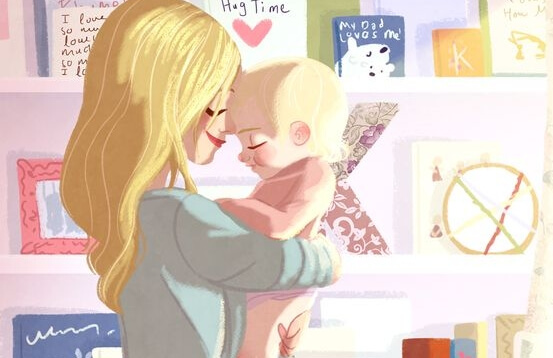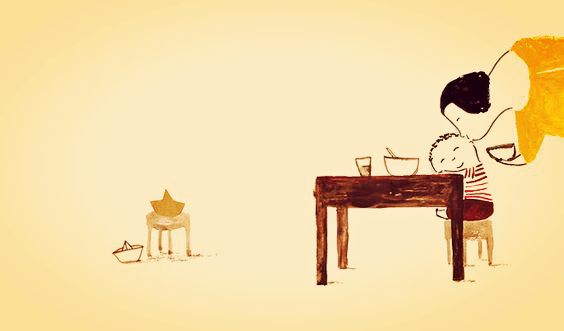The Art of Pampering


Written and verified by the psychologist Valeria Sabater
The art of pampering comes straight from the heart. Pampering a child is the most beautiful thing we can do as mothers. Every time we meet a child who has never been pampered, we notice it and suffer a bit inside, because we would like to give him all the pampering he has ever needed.
In regard to the art of pampering, the most important thing to learn is to differentiate between a “pampered” child and a “spoiled” child. In the following article, we will explain the differences between both terms.
Let’s face it: if there’s one phrase we are tired of hearing, it’s “Your child is very spoiled.” We also commonly hear, “How pampered your child is!”
Although the speaker does not have a bad tone of voice, there is a certain reproach in the statement. We think to ourselves, “Am I overdoing it? Why do they tell me this every time I care for my child?”
Most people forget that there is a subtle difference between a spoiled child and a pampered child. In fact, people tend to consider both to be synonymous with bad parenting. This negative connotation can stem from the lack of information about it, so we want to clarify the matter.
It is said that a mother pampers when she is prone to demonstrate her affection toward her children with kisses, hugs, compliments and beautiful words.
Whatever is given to children, children will give to society.
-Karl A. Menninger-
According to the Royal Spanish Academy Dictionary, a pampered child is one who receives many demonstrations of affection and flattery. The pampering is a show of tenderness, given with care and delicacy.
For example, when you caress your baby and give him love, you are pampering him. Why? Because you are giving him affection in a delicate, tender way.
A spoiled child is one with whom parents are usually lenient. The difference is that a spoiled child is permitted to do things to excess, while the pampered child simply receives a lot of affection.
There are children who are spoiled and pampered at the same time. But not all cases are like that.

The art of pampering
Nothing is more beautiful than caring for our little ones through the art of pampering, when done wisely. Being a loving, attentive and delicate mother is a way to favor the psychological and emotional well-being of our children.
A good mother knows how to establish the right strategies to avoid crossing the line of pampering toward consent and excess permission. She will provide love but at the same time avoid creating a personality that is harmful to the child. In addition, a child who is pampered will be more receptive to emotions.
Contrary to what many people think, the child who receives constant affection and manifestations of love can become stronger and more sure of himself than the one who does not receive affection under the slogan: “without nonsense you will be stronger.”
Conscious parenting: I choose to pamper you without spoiling you
When we pamper our children, does it really affect them so positively? The answer is YES, and to understand it, we must find the answer based on the theory of attachment.
The concept of attachment parenting was described by pediatrician William Sears. He planted the seed of the movement known as conscious parenting, now known as attachment parenting or natural, respectful and conscious parenting.
A child who is pampered can become an individual with greater emotional maturity and can develop a secure attachment. In turn, a secure attachment favors the development of a safe and independent personality.
This security also benefits the child’s self-esteem. Both caresses and attention are roots that raise children with more solid personalities in the long-term.
The slogan is: I choose to pamper you without spoiling you. I love you so that you feel loved and learn to value those who love you.

A child who is pampered and receives security and stable affection does not know about blackmail or toxicity and will never become a small tyrant or dependent child. The child who is pampered learns the value of emotional language and will feel free and safe to respond in the same way to those he loves.
Freedom
Mothers who pamper their children do so because they love them. They know that pampering is the exclusive synonym of treating someone with tenderness and of teaching with affection and consideration.
They also understand that parenting with respect has a very specific goal: to guide our children from the heart so that every day they feel more secure and more free, until the time comes when they forge their own paths.
Pampering, in fact, has no expiration date. It continues even into adulthood, where we continue to treat our children with the most wonderful affection. After all, that’s what it means to love wisely.
All cited sources were thoroughly reviewed by our team to ensure their quality, reliability, currency, and validity. The bibliography of this article was considered reliable and of academic or scientific accuracy.
- Bowlby, J. (1986). Vínculos afectivos: formación, desarrollo y pérdida. Madrid: Morata.
- Bowlby, J. (1995). Teoría del apego. Lebovici, Weil-HalpernF.
- Garrido-Rojas, L. (2006). Apego, emoción y regulación emocional. Implicaciones para la salud. Revista latinoamericana de psicología, 38(3), 493-507. https://www.redalyc.org/pdf/805/80538304.pdf
- Marrone, M., Diamond, N., Juri, L., & Bleichmar, H. (2001). La teoría del apego: un enfoque actual. Madrid: Psimática.
- Moneta, M. (2003). El Apego. Aspectos clínicos y psicobiológicos de la díada madre-hijo. Santiago: Cuatro Vientos.
This text is provided for informational purposes only and does not replace consultation with a professional. If in doubt, consult your specialist.
